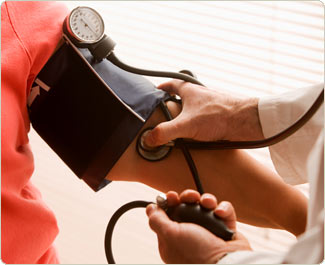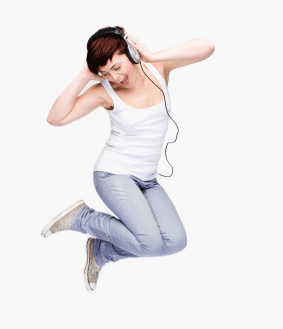 |
 |
|

If you have, or are
at risk of developing high blood pressure, here are some things you can
to get your blood pressure down, and keep it there.
Maintain optimal weight and exercise.
Small amounts of weight loss can improve blood pressure, and as little
as 30 minutes of moderate exercise a day, like walking, can be one of
the most effective natural remedies for high blood pressure.
Relax.
Relaxation techniques that can help lower blood pressure include Tai
Chi, breathing exercises, meditation, yoga, biofeedback, or simply
taking a few minutes to yourself and enjoying a nice bubble bath.
Curb bad habits.
Caffeine and alcohol are both linked to higher blood pressure – after
consumption and overall. Smoking contributes to all cardiovascular
diseases, including high blood pressure, as well as a variety of other
serious ailments. To help quit, call 1-800-quit-now, or visit www.smokefree.gov.
Eat 8 to 10 servings of fruit and vegetables per day. Many of the nutrients in fresh foods help optimize cardiovascular function, and will steer you away from more processed foods.
Eat plenty of fish, nuts, seeds, and dry beans. Include
at least 3 servings of fish, and 4-5 servings of nuts, seeds, and dry
beans per week. The fish should be cold-water fatty fish, rich in
omega-3s.
Limit animal protein to 6 oz per day, from lean sources. With all the fish and nuts you’ll be eating, your body will get plenty of protein!
Get vitamin C, calcium & magnesium. Inadequate
intake of these minerals has been associated with high blood pressure.
Men need approximately 500-600 mg of calcium – women need twice this
amount. Use all sources of available calcium: milk, calcium rich
vegetables and legumes, and supplements.
|
|
 |
 |

Depressive
disorders are characterized by a sad/irritable mood that exceeds normal
feelings of sadness in intensity and duration. The negative thoughts,
feelings, and behaviors accompanied by depression are only the
beginning of the symptoms those with depression suffer--changes in
bodily functions like body aches, low energy and/or libido, and
problems with weight, eating, and sleeping are also common. The changes
in the functionality of the bodies of those suffering from depression
are referred to as neurovegetative signs, referring to the fact that
when the nervous system is altered by depression, physical changes
result, often causing diminished abilities and participation.
A sick mind can
easily lead to a sick body, which is one of the major reasons treating
depression is so important. Anxiety, stress, and depression that
continue for extended periods of time without relief can lead to a
condition known as distress. Distress is your body's negative reaction
to stress and can disturb your body's equilibrium, which can lead to
health problems like insomnia, sexual dysfunction, headaches, upset
stomach, chest pain, and elevated blood pressure. A major study also
found that depression caused more health problems than those suffering
from arthritis, chronic lung disease, hypertension, and diabetes.
Because of the many health problems that happen as a result of
depression, it's frequently under-diagnosed. More so than just making
it likely that sufferers of depression will develop these medical
conditions, those who battle depression have weakened immune systems,
in addition to a diminished desire to fight their way back to good
health.
According to WebMD.com, depression affects more than 19
million people each year, a serious epidemic that affects the way
sufferers function at work, at home, and in relationships. Depression
should be considered a serious illness that requires immediate
attention for the health and safety of the patient. In most cases, a
full recovery from depression is possible; allowing patients to slowly
return to their original lives as they feel happier, healthier,
stronger, and more able to deal with the everyday stresses of life.
|
|
 |
 |
|
Many
people are familiar with the concept behind music therapy, but not
everyone thinks to incorporate this into their own life. Armed with the
knowledge that listening to certain types of music can lift your mood
or alter it in other desirable ways, you can create your own reality.
This knowledge can also inform your decision when it comes to music
that would negatively affect you.
One
of the most obvious things that music does is alter your mood. The next
time you're feeling down, think about what kind of music you feel like
listening to. It might be that you instinctively go for something sad
to match your mood. When you catch yourself doing that, pick out music
that feels joyful to you, and listen to that instead. Before you know
it, you'll be feeling better. One thing that happens in your body is
that your brain waves shift to match the tempo of the music. A faster
tempo will enhance your alertness and lengthen your concentration span.
A
study at the University of Maryland School of Medicine in Baltimore
discovered that listening to music that you find to be joyful can
actually improve your cardiovascular health. When participants in a
study listened to joyful (in their opinion) music, their blood vessels
dilated by as much as twenty three percent. Meanwhile, when they
listened to music that caused them anxiety, their blood vessels
constricted as much as nine percent. Hearing music you enjoy can
increase blood flow throughout your entire body.
Music also
directly affects heart rate as well as breathing rate. To slow down,
relax, and meditate, listening to music that is calming can help you
relieve stress and enter a meditative state. Decreasing stress levels
is one of the best things you can do for your health, both physically
and mentally, so the next time you turn the stereo on, think about your
choice in music and how it will affect you.
|
|
 |
Nearly
half of employers surveyed reported a problem with employees coming
into work while sick. Organizations are more prone to send sick
employees home, or discourage them from coming into work – a marked
shift from the past.
Traditional sick day policies, deadlines,
and concern about lost wages are all reasons we may venture to work
while sick. However, this is neither good for the sick person or their
co-workers. Illnesses spread through air and contact – direct and
indirect, and in many work environments bugs can spread rapidly.
Staying home is the best prevention.
Aside from protecting
your coworkers, the best thing for you when you are ill is rest. Going
into work prematurely may prolong the illness, or set you up to catch
more bugs down the road – take the sick day now, and be thankful later.
|
|
 |
|
|
|
 |
|
In this Issue:
|
|
 |
|
Contact Information
|
Name
Phone
Website
|

|
|
Healthy Habits
|
|

Exercise at least 30 minutes, 5 days per week.
Add Omega-3 Fatty Acids to Your Diet. 3 servings of cold water fish and 5-6 servings of nuts and legumes per week.
Get Enough Sleep - 8 hours a night!
Eat Breakfast to cut back on over all caloric intake each day, and give you the right kind of energy for the day.
Snack
on Fruits and Vegetables, instead of chips, candies, and other
processed foods. Fiberous = filling, and less likely to bust your
calorie count for the day.
Eat & drink low or no fat dairy.
Calcium for strong bones and healthy cardiovascular systems, and a
filling snack shown to promote weight loss.
Stay in Touch with Friends. Social lives are important for mental health, which impacts your overall physical health.
Practice
Good Dental Hygiene. Flossing adds up to 6 years to the average life
span, and gives you a much prettier smile, to boot.
Spend time
with a hobby or interest. Mental rest, happy feelings and a sense of
self-confidence are all derived from our hobbies, and keep us
rejuvenated and mentally sharp.
Protect Your Skin. Sunscreen, long sleeves, and hats to prevent skin trouble down the road.
Drink
Water. Approximately 64 ounces per day to maintain proper hydration -
more if you drink dehydrating drinks like coffee and sodas. Hydration
helps everything from your mood to your skin to digestion.
Drink
Green Tea. Cancer-preventing anti-oxidents and a corrolation to weight
loss and brain building make this a more preferred source of caffeine.
Take
a Daily Walk. Walks boost our mood, help us to de-stress, and promote
healthy joints, bones and cardiovascular systems. Walking is why we
have legs, after all, and just 20 steps burns 1 calorie.
 |

|
|
Patient's Rights
|
There
are several patient Bills of Rights, covering a myriad of health care
issues, such as the mental health care patient Bill of Rights, or the
Female Patient Bill of Rights.
Below is a general Bill of Rights covering your basic rights as a patient.
You
have the right to true and understandable information regarding your
health care plan, health care professionals, and health care facilities.
You have the right to choose health care providers who can give you high-quality health care when you need it.
If
you believe that your health is in serious danger, you have the right
to be screened and stabilized using emergency services, when you need
them, without waiting for authorization or encountering financial
restrictions.
You have the right to know your treatment options and play an active role in making decisions about your care.
You
have a right to considerate, respectful, and non-discriminatory care
from your doctors, health care providers, and representatives.
You
have the right to privacy and protected health care information. All
conversations with your health care providers should be kept
confidential.
You also have the right to access your medical
records and make copies. If there is inaccurate or incomplete
information, you have the right to request your health care provider
changes it.
You have the right to a fair, fast, and objective
review of any health-care related complaint you make. This includes
facilities, personnel and health plan providers.
For more information, visit the American Hospital Association website, or speak with your health care providers.
|
|
 |

